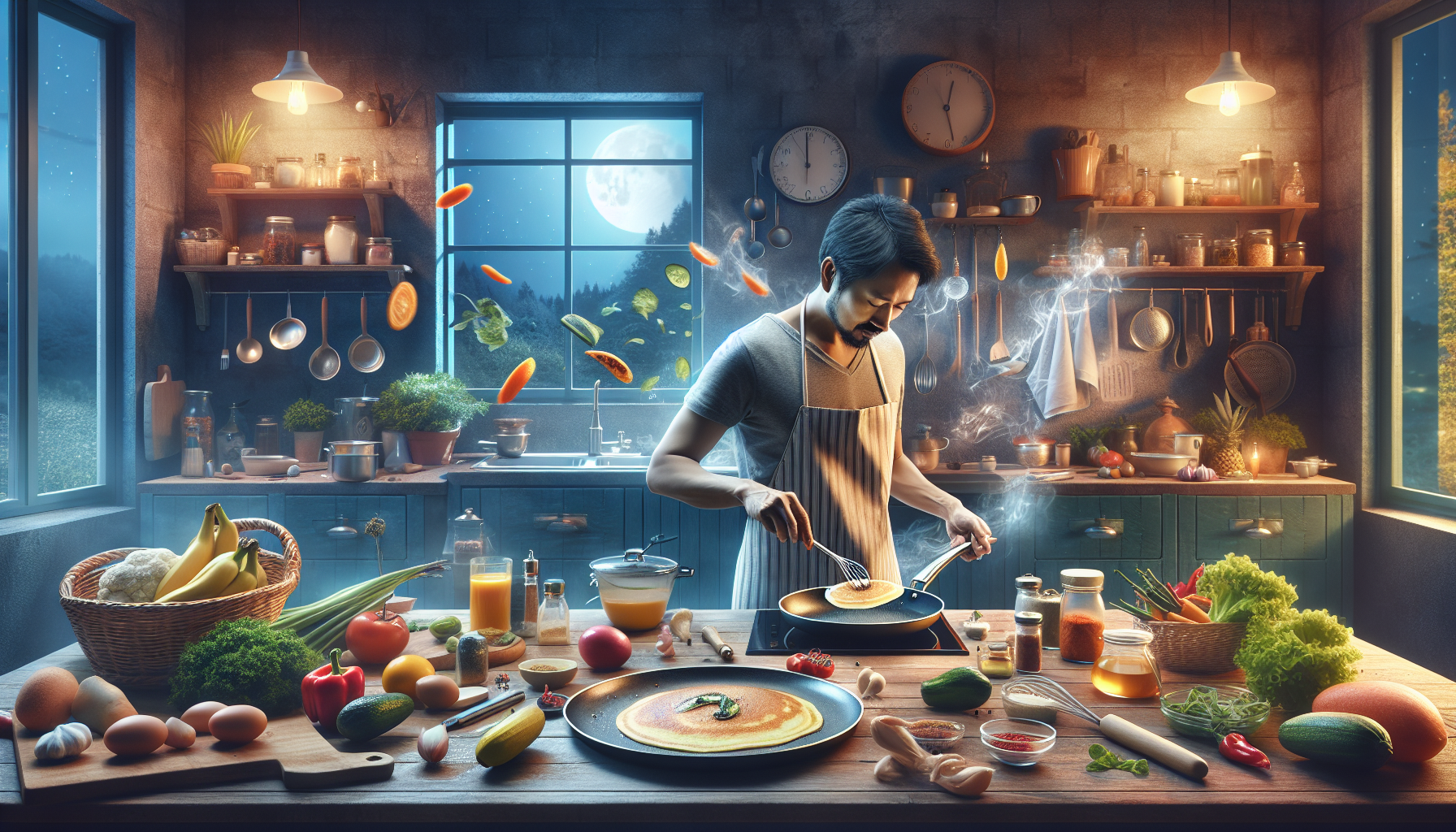Imagine stepping into your kitchen, armed with only your culinary imagination and a collection of fresh ingredients. No judgment, no limitations, just pure creative freedom. Solo cooking allows you to explore your inner chef, experiment with flavors, and tailor your meals to perfectly suit your taste buds. From inventing new recipes to adjusting existing ones, the possibilities are endless. Dive into the world of solo cooking and unlock the endless possibilities that await you in your very own kitchen.
The Joy of Experimentation
Exploring Flavors and Ingredients
When cooking alone, you have the incredible opportunity to explore a wide range of flavors and ingredients. You can experiment with different spices, herbs, and sauces to create unique and exciting dishes. Have you ever wanted to try that exotic ingredient you saw at the grocery store? Now is the perfect time! You can let your taste buds guide you and discover new flavor combinations that you may not have considered before. The freedom to explore different ingredients allows you to expand your culinary knowledge and palate.
Trying New Techniques
Solo cooking provides the perfect environment for trying out new cooking techniques. Whether it’s mastering the art of sautéing, perfecting your knife skills, or learning to make homemade pasta from scratch, you have the freedom and time to practice these techniques without any distractions. You can watch tutorial videos, read cookbooks, or take online cooking classes to learn new cooking methods. Trying new techniques not only adds depth to your culinary skill set but also enhances your overall cooking experience.
Creating Unique Dishes
One of the joys of solo cooking is the ability to create unique dishes that reflect your personal taste and style. With no restrictions or limitations, you can let your creativity run wild and experiment with different combinations of flavors, textures, and ingredients. You can put your own twist on traditional recipes or even create entirely new dishes from scratch. The freedom to create unique dishes allows you to express your individuality and satisfy your culinary curiosity.
Mixing and Matching Recipes
Solo cooking gives you the freedom to mix and match recipes to create a meal that perfectly suits your tastes and preferences. Feel like having the main course from one recipe and the side dish from another? Go for it! You can adapt recipes to fit your dietary needs, portion sizes, and personal preferences. Whether you’re a fan of fusion cuisine or simply want to experiment with different flavor profiles, mixing and matching recipes allows you to create a truly personalized dining experience.
Personalized Portions
Cooking for One
One of the greatest advantages of solo cooking is the ability to cook for yourself without worrying about cooking for a crowd. You can prepare meals that are perfectly portioned for a single serving, eliminating any need to scale down recipes or deal with leftovers. Cooking for one allows you to be in control of your own meals and ensures that you are nourishing yourself with food that meets your specific dietary needs and preferences.
Customizing Recipes to Fit Preferences
When cooking alone, you have the freedom to customize recipes to fit your preferences. You can easily adjust the amount of spices, seasonings, and ingredients to suit your taste buds. If you have any dietary restrictions or preferences, such as vegetarian, vegan, or gluten-free, you can easily modify recipes to accommodate these needs. This level of customization ensures that you are eating food that aligns with your lifestyle and personal choices.
Reducing Food Waste
Cooking for one allows you to minimize food waste as you can prepare and portion your meals based on your exact needs. You can buy and use ingredients in quantities that suit your consumption, reducing the chances of food being left unused and eventually wasted. By implementing proper meal planning and portion control, you can save money and contribute to a more sustainable lifestyle.
Portion Control
Solo cooking encourages portion control, which is essential for maintaining a healthy lifestyle. By preparing meals for one, you have greater control over the amount of food you consume, helping you manage your calorie intake and prevent overeating. Portion control is an excellent way to maintain a balanced diet and is particularly beneficial for those looking to manage their weight or adopt healthier eating habits.

Flexibility in Timing
Cooking at Your Own Pace
When cooking alone, you have the freedom to cook at your own pace without any external pressure or time constraints. You can take your time to enjoy each step of the cooking process, savoring the aromas and flavors that fill your kitchen. Whether you prefer a leisurely cooking session or a quick meal preparation, you have the flexibility to adapt the timing to suit your schedule and preferences.
Adapting Recipes to Fit Schedule
One of the greatest advantages of solo cooking is the ability to adapt recipes to fit your schedule. If you have a busy day, you can opt for quick and simple recipes that require minimal preparation and cooking time. On the other hand, if you have more free time, you can choose to tackle more complex recipes that involve multiple steps and longer cooking times. This flexibility allows you to enjoy freshly cooked meals regardless of your daily schedule.
Enjoying Freshly Cooked Meals
Solo cooking enables you to enjoy freshly cooked meals whenever you desire. Unlike ordering takeout or dining out, where you often have little control over the freshness and quality of the food, cooking alone allows you to prepare meals using the freshest ingredients available. You can savor the satisfaction of a warm and delicious home-cooked meal straight from your kitchen. The freedom to enjoy freshly cooked meals contributes to a healthier and more fulfilling culinary experience.
Freedom of Presentation
Plate as You Please
When you cook solo, you have the freedom to plate your meals exactly how you want them. You can create visually stunning presentations or go for a more rustic, family-style approach. From elegant arrangements to artful compositions, you can let your creativity shine through your plating choices. You have the power to make your dish visually appealing and enticing, enhancing the overall dining experience.
Experimenting with Plating Techniques
Solo cooking allows you to experiment with various plating techniques. You can try your hand at creating delicate drizzles, precise quenelles, or even intricate garnishes. The freedom to experiment with plating techniques allows you to elevate the presentation of your dishes and impress yourself and others with your culinary skills. By exploring different plating techniques, you can turn a simple meal into a visually captivating masterpiece.
Incorporating Artistic Elements
Cooking alone gives you the opportunity to incorporate artistic elements into your meals. You can garnish your dishes with fresh herbs, edible flowers, or colorful sauces to add vibrant pops of color. You can also play with different textures and shapes to create visually stimulating plates. The freedom to incorporate artistic elements enhances your overall dining experience and allows you to express your creativity through food.
Expressing Individual Style
One of the joys of solo cooking is the freedom to express your individual style through your plating choices. You can let your personality shine through your dishes, whether it’s through bold color choices, unique plating arrangements, or innovative presentation styles. The ability to express your individual style not only enhances your pride in your culinary creations but also makes each meal a true reflection of your personality and taste.

Cooking on a Budget
Affordable Ingredients
Cooking alone can be an excellent way to save money while still enjoying delicious meals. You have the freedom to choose affordable ingredients that fit within your budget without sacrificing taste or quality. By opting for seasonal produce, pantry staples, and economical cuts of meat or plant-based proteins, you can create flavorful and nutritious meals at a fraction of the cost of dining out or ordering takeout.
Lowered Expense for Single Servings
One of the advantages of solo cooking is that you can significantly reduce the cost per serving compared to cooking for a larger group. Rather than purchasing ingredients in bulk or preparing large quantities of food, you can buy and use only the amount you need, resulting in lowered expenses. This cost-effective approach not only saves you money in the long run but also allows you to focus on quality rather than quantity.
Stretching Ingredients over Multiple Meals
Solo cooking encourages resourcefulness and the ability to stretch your ingredients over multiple meals. Leftover roasted chicken can be transformed into a comforting chicken noodle soup, and extra cooked quinoa can be used to make a hearty salad for tomorrow’s lunch. By repurposing and using ingredients creatively, you can minimize food waste and maximize your budget, getting the most out of each ingredient you purchase.
Healthy and Nutritious Choices
Control Over Ingredients
Solo cooking gives you full control over the ingredients that go into your meals. You can choose high-quality ingredients, opt for organic and locally sourced produce, and eliminate any additives or preservatives that may be found in pre-packaged or processed foods. By being in complete control of the ingredients, you can ensure that your meals are wholesome, nutritious, and tailored to your dietary needs.
Balancing Nutrients
When cooking alone, you have the freedom to create balanced meals that provide your body with the nutrients it needs to thrive. You can incorporate a variety of fruits, vegetables, whole grains, lean proteins, and healthy fats into your dishes to ensure you are getting a well-rounded meal. By consciously balancing the macronutrients and micronutrients in your meals, you can support your overall health and well-being.
Encouraging a Balanced Diet
Solo cooking encourages a balanced diet by providing you with the opportunity to make deliberate and thoughtful choices when planning your meals. You can incorporate a variety of food groups and experiment with different cooking methods to create a well-rounded diet. The freedom to choose and cook your own meals ensures that you have control over the nutritional content and can strive for a balanced and nutrient-rich eating pattern.
Catering to Dietary Restrictions
Cooking solo is ideal for those with dietary restrictions or specific dietary needs. Whether you have food allergies, intolerances, or follow a specific eating plan, you have the freedom to customize your meals to cater to these restrictions. You can easily adapt recipes, substitute ingredients, or create alternative versions of your favorite dishes to ensure that your dietary needs are met. This level of customization and flexibility allows you to enjoy delicious and satisfying meals that align with your health and dietary goals.
Exploration of Culinary Culture
Diving into Ethnic Cuisines
When cooking alone, you have the opportunity to explore and dive into various ethnic cuisines from around the world. You can try your hand at cooking traditional dishes from different cultures, experimenting with spices, ingredients, and cooking techniques unique to each cuisine. Exploring ethnic cuisines not only expands your culinary horizons but also allows you to appreciate and respect diverse food cultures.
Experimenting with Global Flavors
Solo cooking enables you to experiment with global flavors by incorporating ingredients and spices from different cuisines into your dishes. You can recreate your favorite flavors from international destinations or get creative with fusion cuisine, combining elements from different regions to create exciting new taste experiences. The freedom to experiment with global flavors adds depth and richness to your cooking repertoire.
Learning Traditional Techniques
Cooking alone allows you to learn and practice traditional cooking techniques from different cultures. You can delve into the intricate art of making sushi, master the technique of perfect stir-frying, or learn to knead and shape dough for traditional bread recipes. Learning traditional techniques not only adds to your culinary skills but also deepens your appreciation for the cultural heritage associated with each dish.
Appreciating Food from Around the World
Solo cooking provides the perfect platform for appreciating and celebrating food from around the world. You can recreate dishes that transport you to exotic destinations and savor the flavors that represent different culinary traditions. By exploring and appreciating food from diverse cultures, you develop a greater understanding and respect for the global tapestry of flavors and ingredients.
Therapeutic and Mindful Cooking
Relaxing and Focusing on the Process
Cooking alone can be a therapeutic and meditative experience. It offers you the opportunity to relax and focus on the process of creating a meal from start to finish. As you chop, sauté, and stir, you can immerse yourself in the sights, sounds, and smells of the kitchen, allowing the act of cooking to calm and center your mind. The therapeutic nature of solo cooking can provide a much-needed break from the stresses of daily life.
Cooking as a Stress-Reliever
For many people, cooking is a stress-reliever, and solo cooking allows you to fully immerse yourself in this calming activity. As you engage in the rhythmic motions of chopping vegetables or stirring a simmering sauce, you can find solace and find a sense of accomplishment in creating a nourishing meal for yourself. The act of cooking can help you relax, unwind, and find a moment of peace in the midst of a busy day.
Mindful Eating
Solo cooking naturally lends itself to mindful eating, as you have the opportunity to fully savor and appreciate every bite of your meal. You can take the time to sit down, eliminate distractions, and savor each flavor and texture on your plate. By practicing mindful eating, you can develop a deeper connection with your food, enhance your culinary experience, and improve your overall relationship with eating.
Self-Care through Cooking Experience
Cooking solo can be an act of self-care. By taking the time to prepare a delicious and nourishing meal for yourself, you are prioritizing your well-being and showing yourself love and care. The process of cooking can be a form of self-expression and self-indulgence, allowing you to create a culinary experience that brings you joy and fulfillment. By engaging in solo cooking as an act of self-care, you can nourish your body, mind, and soul.
Inspired by Seasonal and Local Ingredients
Supporting Local Farmers
Cooking alone gives you the opportunity to support local farmers and explore the seasonal produce available in your area. By purchasing ingredients from farmers’ markets or subscribing to community-supported agriculture (CSA) programs, you can directly support local farmers and contribute to the sustainability of small-scale agriculture. The availability of seasonal and local ingredients adds freshness, flavor, and nutritional value to your meals.
Eating with the Seasons
Cooking solo allows you to embrace the beauty of eating with the seasons. You can adapt your meals to align with the fruits, vegetables, and herbs that are in season, maximizing their flavor and nutritional content. By eating seasonally, you can experience a diverse and ever-changing variety of ingredients that reflect the natural rhythms of the Earth. Cooking with seasonal produce not only enhances the taste of your meals but also supports a more sustainable and environmentally friendly food system.
Enjoying Fresh and Flavorful Produce
When cooking alone, you can truly appreciate the qualities of fresh and flavorful produce. By selecting ripe and locally sourced fruits and vegetables, you can experience their vibrant colors, fragrant aromas, and distinctive flavors. The freedom to enjoy fresh and flavorful produce elevates the quality of your meals and highlights the natural beauty of the ingredients.
Creating Seasonal Menus
Solo cooking allows you to create seasonal menus that showcase the best ingredients available at any given time of the year. By planning your meals around seasonal produce, you can ensure that your dishes are bursting with flavor and nutritional value. From spring-inspired salads to hearty fall stews, seasonal menus provide a sense of connection to the changing seasons and allow you to fully embrace the culinary offerings of each time of year.
Cultivating Independence and Life Skills
Developing Cooking Knowledge
Cooking alone provides the ideal environment for developing your cooking knowledge and skills. You can expand your culinary repertoire by trying new recipes, experimenting with different cooking techniques, and learning from your own successes and failures. The freedom to cook alone allows you to become a more knowledgeable and confident cook, empowering you to tackle any culinary challenge that comes your way.
Gaining Confidence in the Kitchen
Solo cooking is a fantastic way to gain confidence in the kitchen. As you navigate your way through recipes, tackle new techniques, and experiment with different flavors, you will develop a sense of self-assurance in your cooking abilities. With each successful meal, your confidence will grow, and you will become more comfortable taking risks and exploring your culinary creativity.
Learning to Rely on Oneself
Cooking alone teaches you to rely on yourself and take responsibility for your own nourishment. You become self-sufficient in the kitchen, developing the skills to prepare meals that fuel your body and satisfy your taste buds. By learning to rely on yourself, you cultivate a sense of independence and autonomy that transcends the kitchen and extends into other aspects of your life.
Building Fundamental Life Skills
Cooking alone is not just about preparing meals but also about building fundamental life skills. Through solo cooking, you learn essential skills such as meal planning, budgeting, and time management. You develop problem-solving abilities as you adapt recipes to fit your needs and navigate the kitchen with confidence. The skills acquired through solo cooking extend far beyond the realm of food and contribute to your overall personal and professional development.
In conclusion, solo cooking offers a myriad of creative freedoms that allow you to explore, express yourself, and become a more competent and confident cook. From experimenting with flavors to enjoying the therapeutic nature of the cooking process, solo cooking provides a platform for culinary exploration, self-care, and personal growth. Embrace the joy of solo cooking and embark on a culinary journey that is uniquely yours.
